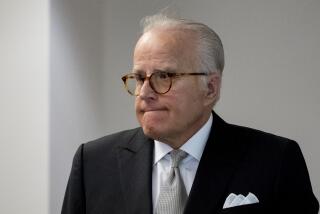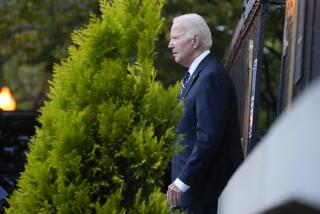Bush’s Official Duties Raise Questions on His Iran Role
WASHINGTON — Vice President George Bush, more than any other senior official at the White House, has avoided direct comment on the Iranian arms-and-hostages scandal. And aides described Bush as “stunned” by the disclosure that profits from the deal were diverted to Nicaraguan rebels.
Yet Bush’s official duties have placed him so close to the center of White House national security policy that questions are beginning to be raised about what he knew and what role he may have played in the decisions leading up to the most severe crisis of the Reagan era. And if he had no part in the affair, what does Bush’s exclusion from such a critical matter say about his role in the Administration’s upper councils?
With new disclosures about the Iranian scandal emerging almost daily and major elements still unknown, congressional leaders are only beginning to focus on what role specific top officials may have played. But sources on Capitol Hill indicated late last week that the question of what Bush--as one of the top officials in the Administration--may have known or done is an element they expect to explore in the weeks ahead.
“It’s premature to say what people are going to do” with regard to Bush, said an aide to the Senate Democratic leadership. “We’ve seen one-tenth of what is going to come out; we don’t know what the other nine-tenths are.” But “the clear direction it points to is Donald Regan (the White House chief of staff) and George Bush” as officials with responsibility for such matters, he said.
Going further, in a report issued by a subcommittee of the House Judiciary, subcommittee chairman John Conyers Jr. (D-Mich.) called Friday for appointment of an independent counsel to investigate the case and named Bush among those whose actions should be scrutinized.
Added a Republican source with close ties to the White House: “Bush has certainly not been out front defending the President’s policy, and it’s a question mark exactly what his role has been in all this.”
One thing is clear: President Reagan has assigned a substantial role in the national security process to Bush, who is a former director of the CIA. The vice president chairs the daily National Security Council meetings at the White House and heads the Administration task force that coordinates all activities designed to combat terrorism. And combating terrorism--as well as winning freedom for American hostages--were cited by the President as reasons for shipping arms to Iran, despite the U.S. embargo.
Moreover, according to two government sources, Bush was briefed several times by Marine Lt. Col. Oliver L. North earlier this year during the period when North was in charge of coordinating private aid to Nicaragua’s contra rebels.
North, fired as a National Security Council staff member last Tuesday because of his role in the scandal, “met with the vice president several times to talk about Central America,” said one government official who declined to be identified. “Ollie was carrying water on Central America for the Administration.”
A second government source, who also requested anonymity, said that Bush was frequently briefed by North on the Iranian arms deal and kept apprised of developments on North’s operations both in the Middle East and Central America through the vice president’s national security aide, Donald P. Gregg, a former CIA employee.
It could not be learned whether North told Bush about the diversion of profits from the Iranian arms sales to buy supplies and weapons for the contras. Atty. Gen. Edwin Meese III, who is heading a Justice Department investigation into the arms deal, has said that neither Bush nor anyone else above the level of national security adviser John M. Poindexter knew about the diversion of funds until Meese’s probe uncovered it last weekend and he informed them on Monday.
Bush was also the Washington sponsor of Felix Rodriguez, the Cuban-born CIA veteran of the Bay of Pigs invasion who--under the nom de guerre of Max Gomez--ran the secret contra airlift from Ilopango Air Base in El Salvador. Bush recommended to Salvadoran air force officials that they hire Rodriguez as an adviser, the job which led to his role as the contras’ cargo boss.
Rodriguez has told associates that he reported frequently on his activities to Gregg. Bush has confirmed that he met with Rodriguez three times but said they talked only about El Salvador. Gregg has refused to divulge the nature of his discussions with Rodriguez.
Moreover, it is known that Bush attended at least some of the White House meetings that led to Reagan’s decision last January to authorize the secret arms shipments to Iran and conceal the operation from Congress. It is not known what position, if any, Bush took on the plan.
The vice president has avoided comment on the scandal since it surfaced, and neither he nor any of his spokesmen were available to comment on the briefings he received from North. Bush ignored reporters’ questions about the scandal last Wednesday during a short Thanksgiving ceremony at the White House and, questioned on the funds diversion scheme while out jogging Saturday, said only: “No role in it.”
In answer to recent inquiries, Marlin Fitzwater, his press secretary, said that Bush “had no knowledge” of the diversion of funds.
White House Chief of Staff Donald T. Regan, who had branded as “ridiculous” reports that he had been briefed on the transfer of funds to the contras, said, “I have no idea at all,” when asked Friday whether Bush had been briefed on the matter.
On Capitol Hill, an aide to the Senate Democratic leadership said that Bush and Regan both may be called to testify at hearings.
Bush sat in on a briefing Reagan gave to eight or 10 congressional leaders last Tuesday just before the President went on national television to announce the Meese investigation, the firing of North and the resignation of Poindexter.
Later, Rep. William S. Broomfield (R-Mich.), ranking Republican on the House Foreign Affairs Committee, said that the Vice President sat silently--”without saying a word”--throughout the session.
California Rep. George Brown Jr. (D-Riverside), a member of the House Intelligence Committee, dismissed the role of the vice president as a figure in Administration deliberations: “Very honestly, at no time in the meetings of the Intelligence committees has George Bush’s role come up . . . The general attitude toward the vice president, any vice president, is that he doesn’t play a big role in the decision-making.”
Yet that view of the vice president, while sparing him from taint by the scandal, would erode the image of himself that Bush has long sought to project as an important member of the Reagan team.
Inevitably, Bush’s role--or lack of it--could create political problems that could affect his chances to win the Republican presidential nomination in 1988, for which recent polls showed him to be the leading contender.
But Fitzwater said: “I don’t think if the Congress and the press look more deeply into U.S. aid to the contras in Nicaragua that things will begin to unravel for the vice president.”
More to Read
Get the L.A. Times Politics newsletter
Deeply reported insights into legislation, politics and policy from Sacramento, Washington and beyond. In your inbox three times per week.
You may occasionally receive promotional content from the Los Angeles Times.










